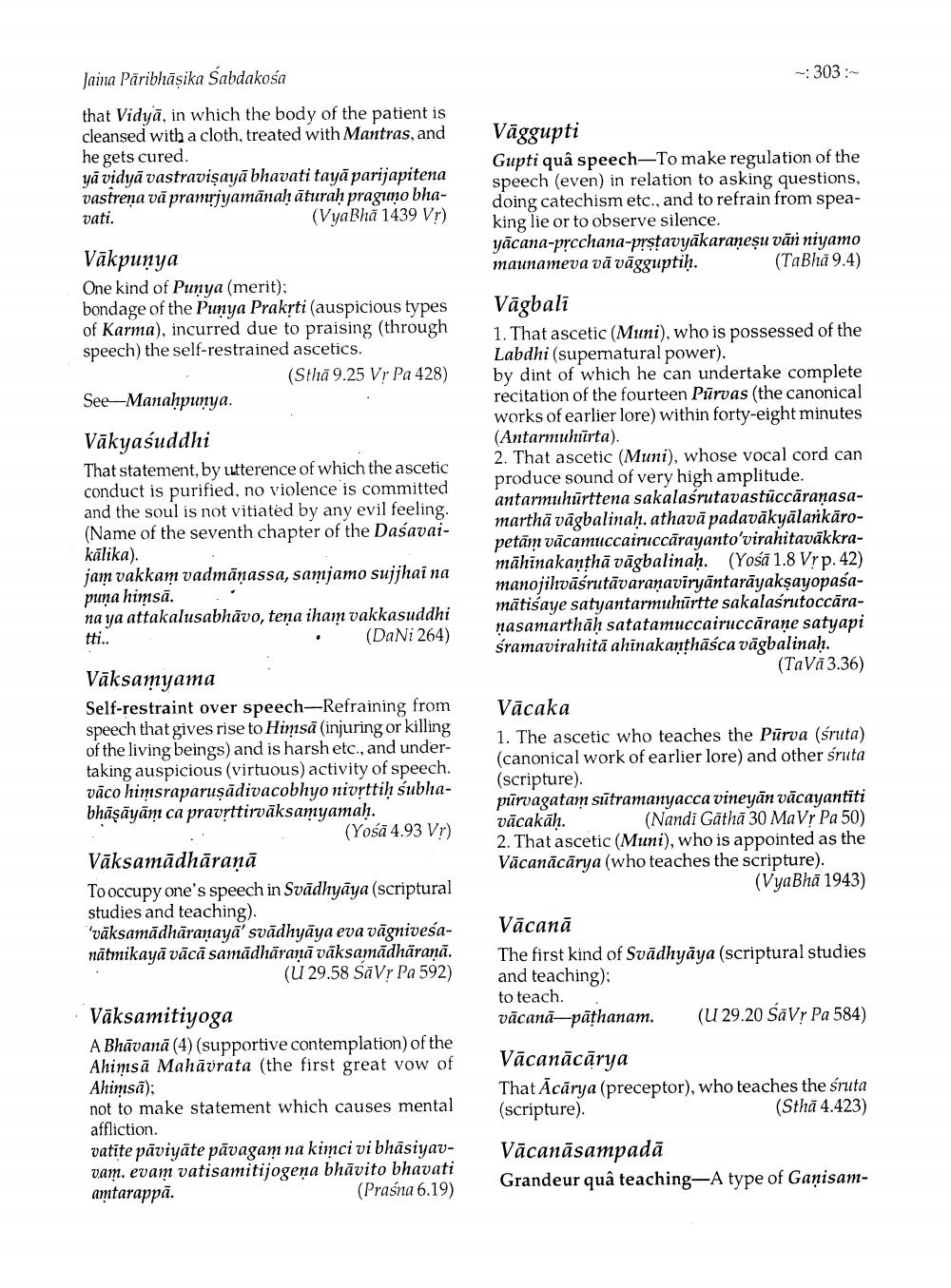________________
Jaina Pāribhāșika Sabdakosa
- 303 -
that Vidyā, in which the body of the patient is cleansed with a cloth, treated with Mantras, and he gets cured. ya vidyā vastravişayā bhavati tayā parijapitena vastrena vā pramrjyamanahāturah praguno bhavati.
(Vya Bhā 1439 Vr)
Vāggupti Gupti quâ speech-To make regulation of the speech (even) in relation to asking questions, doing catechism etc., and to refrain from speaking lie or to observe silence. yācana-prochana-prstavyākaranesu vār niyamo maunameva vā vāgguptih. (TaBhā 9.4)
Vākpunya One kind of Punya (merit); bondage of the Punya Prakyti (auspicious types of Karma), incurred due to praising (through speech) the self-restrained ascetics.
(Sthā 9.25 Vr Pa 428) See-Manahpunya.
(Sma
Vākyasuddhi That statement, by litterence of which the ascetic conduct is purified, no violence is committed and the soul is not vitiated by any evil feeling. (Name of the seventh chapter of the Daśavaikālika). jam vakkam vadmāṇassa, samjamo sujjhai na puna hiņsā. na ya attakalusabhāvo, tena iham vakkasuddhi Hi..
• (DaNi 264)
Vägbali 1. That ascetic (Muni), who is possessed of the Labdhi (supernatural power). by dint of which he can undertake complete recitation of the fourteen Pūrvas (the canonical works of earlier lore) within forty-eight minutes (Antarmuhtīrta). 2. That ascetic (Muni), whose vocal cord can produce sound of very high amplitude. antarmuhürttena sakalasrutavastūccāranasamarthā vāgbalinah. athavā padavākyälarkāropetām vācamuccairuccarayanto'virahitavākkramāhinakanthā vāgbalinaḥ. (Yośā 1.8 Vr p. 42) manojihvāšrutāvaranavīryāntarāyakşayopaśamātisaye satyantarmuhürtte sakalasrutoccaranasamarthāh satatamuccairuccärane satyapi sramavirahitā ahinakanthāśca vägbalinah.
(Tavā 3.36)
Vāksamyama Self-restraint over speech-Refraining from speech that gives rise to Himsā (injuring or killing of the living beings) and is harsh etc., and undertaking auspicious (virtuous) activity of speech. vāco himsraparuşādivacobhyo nivettih subhabhāṣāyām ca pravrttirväksamyamah.
(Yośā 4.93 Vr) Vāksamādhāraņā To occupy one's speech in Svādhyāya (scriptural studies and teaching). "väksamădhāraṇayā' svādhyāya eva vägniveśanätmikayā vācā samādhāraņā vāksamädhäraņā.
(U 29.58 śāVr Pa 592)
Vācaka 1. The ascetic who teaches the Pūrva (sruta) (canonical work of earlier lore) and other sruta (scripture). purvagatam sūtramanyacca vineyān vācayantiti vācakān.
(Nandi Gathā 30 Ma Vr Pa 50) 2. That ascetic (Muni), who is appointed as the Vācanācārya (who teaches the scripture).
(Vyabhā 1943)
Vācanā The first kind of Svādhyāya (scriptural studies and teaching); to teach vācana-pāthanam. (U 29.20 SãVPa 584)
Vāksamitiyoga A Bhāvanā (4) (supportive contemplation) of the Ahimsā Mahāvrata (the first great vow of Ahimsā); not to make statement which causes mental affliction. vatite pāviyāte pāvagam na kimci vi bhāsiyavvam. evam vatisamitijogena bhāvito bhavati amtarappa.
(Praśna 6.19)
Vācanācārya That Ācārya (preceptor), who teaches the śruta (scripture)
(Sthā 4.423)
Vācanāsampadā Grandeur quâ teaching-A type of Ganisam




